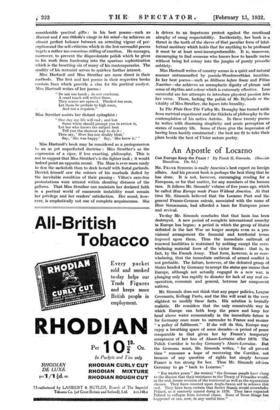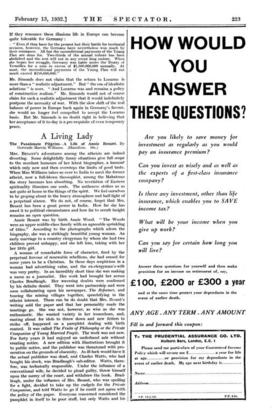An Apostle of Locarno
MR. FRANK SIMONDS is easily America's best expert on foreign affairs. And his present book is perhaps the best thing that he has done. It is not, however, encouraging reading for a European, or for that matter, for any members of the human race. It follows Mr. Simonds' volume of five years ago, which he called How Europe made Peace Without America. At that time Mr. Simonds believed that the Locarno Pact and the general Franco-German entente, associated with the name of Herr Stresemann, had afforded a basis for European peace and revival.
To-day Mr. Simonds concludes that that basis has been destroyed. A new period of complete international anarchy in Europe has begun ; a period in which the group of States defeated in the last War no longer accepts even as a pro- visional arrangement the financial and territorial terms imposed upon them. Thus the immediate outbreak of renewed hostilities is restrained by nothing except the over- whelming material force of the victor States : that is, in fact, by the French Army. That force, however, is so over- whelming, that the immediate outbreak of armed conflict is not probable. The failure, however, of the defeated group of States headed by Germany to accept the status quo means that Europe, although not actually engaged in a new war, is plunging only less rapidly to disseter for lack of any real co- operation, economic and general, between her component nations.
Mr. Simonds does not think that any paper policies, League Covenants, Kellogg Pacts, and the like will avail in the very slightest to modify these facts. His solution is brutally realistic. He considers that the only conceivable way in which Europe can both keep the peace and keep her head above water economically in the immediate future is for Germany once more to surrender to France and resume " a policy of fulfilment." If she will do this, Europe may enjoy a breathing space of some decades—a period of peace comparable to that given her by France's temporary acceptance of her loss of Alsace-Lorraine after 1870. The Polish Corridor is to-day Germany's Alsace-Lorraine. But the Germans must, Mr. Simonds writes, " for all present time " renounce a hope of recovering the Corridor, not because of any question of rights but simply because France is too strong for her. Thus Mr. Simonds advises Germany to go " back to Locarno."
"For twelve years ",(he writes) " the German people have clung to the illusion that their resistance to the Treaty of Versailles would, in the end, insure revision of the territorial as well as the reparations clauses. They have counted upon Anglo-Saxon aid to achieve this end. They have been certain that Soviet Russia would overwhelm Poland, as it narrowly missed doing in 1920. They have expected Poland to collapse from internal chaos. None of these Airings has happened- or can, now, in any useful time." -
If they renounce these illusions life in Europe can become quite tolerable for Germany :
" Even if they have for the present lost their battle for territorial revision, however, the Germans have nevertheless won much by their resistance. All but the unconditional payments of the Young Plan are done for. Two-thirds of the annual tribute has been abolished and the rest will not in any, event long endure. When she began her struggle, Germany was liable under the Treaty of Versailles for a sum in excess of 81,100,000,000 annually. At most, the unconditional payments of the Young Plan will not much exceed $150,000,000.'
Mr. Simonds does not claim that the return to Locarno is more than a " realistic adjustment." But " the era of idealistic solutions " is over. " And Locarno was and remains a policy of constructive realism." Mr. Simonds would not of course claim for such a realistic adjustment that it would indefinitely postpone the necessity of war. With the slow shift of the real balance of power in Europe back again in Germany's favour, she would no longer feel compelled to accept the Locarno basis. But Mr. Simonds is no doubt right in believing that her acceptance of it to-day is a pre-requisite of even temporary peace.







































 Previous page
Previous page